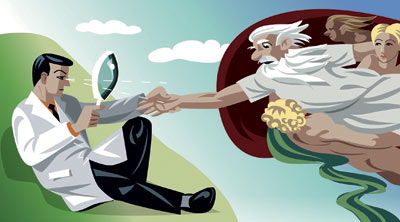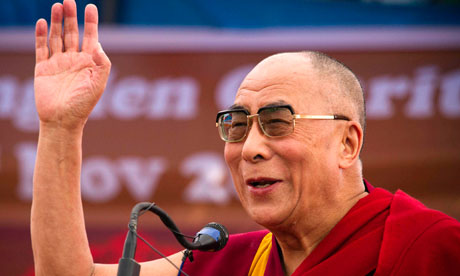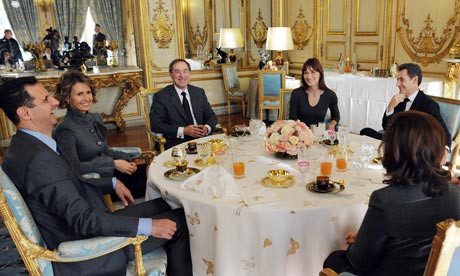By RICHARD DAWKINS - RICHARDDAWKINS.NET
Added: Sun, 26 Feb 2012 20:04:02 UTC - An RDFRS Original
After a week in which the hype about my aggressive militancy has reached new heights, my encounter with the Archbishop of Canterbury has obviously disappointed journalists eager to see blood on the carpet. Poor things, they must have believed their own assiduously cultivated legend.
The Guardian begins its article with laboured drollery:
Roll up, roll up for the heavyweight shadow-boxing championship of the world! A grand contest between Oxford's undisputed champions of atheism and Christianity, Professor Richard Dawkins, and Archbishop Rowan Williams! In the blue corner, the charismatic preacher who has made thousands of converts around the world; in the red corner – Rowan Williams.
But has to settle for the obviously disappointed headline: “No knockout blows in Richard Dawkins v Rowan Williams bout.”
The Times’ earnestly naïve Religion Correspondent, Ruth Gledhill, writes under the headline (which, to be fair, she probably didn’t write herself) “Hopes of an unholy row dashed”:
It was set to be the match of the year between two intellectual heavyweights: Rowan Williams versus Richard Dawkins.
But anyone hoping to see a Haye-Chisora style bust-up was left disappointed. Instead, the Archbishop of Canterbury and the ardent atheist engaged in what can only be described as a perfectly civilised debate.
What is this journalistically invented phrase “set to” anyway? Set by whom? Neither the Archbishop nor I ever had the slightest intention of having a bust-up, and neither of us gave any reason to expect it. The Archbishop certainly never does bust-ups, and nor do I – unlike my mythological namesake dreamed up by journalists and religious apologists. Ruth concludes:
There was just one point, near the end, when Dr Dawkins suddenly realised that Dr Williams actually does believe what he says and the debate looked as though it might take off. But both men were far too polite and, much to the audience’s despair, the moment swiftly passed.
Much to Ruth Gledhill’s and the other hacks’ despair, maybe. The audience seemed delighted that the discussion was – contrary to journalistic hopes – civilised.
The Independent does its best to rack up the drama by citing famous debates of the past. And, by the way, some hapless “researcher” is going to get it in the neck for this:
Aldous Huxley vs Bishop Samuel Wilberforce
At the 1860 Oxford evolution debate, Wilberforce asked the Brave New World writer whether it was through his grandfather's or his grandmother's lineage that he descended from a monkey.
That follows Tim Walker’s report of Thursday's debate, in which he says
But anyone hoping for a dust-up would have been sorely disappointed, for the conversation was conducted with utmost politeness. The cleric even confessed his belief in evolution, and agreed with Dawkins that humans shared non-human ancestors.
Is Tim Walker really surprised that the Archbishop accepts evolution? Did he really need to use the word “confessed”?
In a neat parallel, John Bingham of the Telegraph seems to think it is surprising that I should call myself a 6.9 agnostic. His headline. “Richard Dawkins: I can’t be sure God does not exist” is followed by the sub-heading, “He is regarded as the most famous atheist in the world but last night Professor Richard Dawkins admitted he could not be sure that God does not exist.” Er, which god would that be? I suspect that John Bingham, Tim Walker and all the rest of them would probably “admit” or “confess” to not believing in Thor, Apollo, Mithras or Baal. I don’t admit or confess, but I am agnostic about those gods and a thousand others, to the exact same (very small) extent as I am agnostic about Yahweh, the Trinity and Allah. I suspect that even the Archbishop falls at least a tiny bit short of total certainty that his god exists, in which case he too is agnostic, in a mirror of the sense that I am. We are both far from agnostic in the all-too-commonly misunderstood sense of regarding the likelihood of God’s existence as 50/50.
The Daily Mail, as you might expect, picked up the same angle: “Career atheist Richard Dawkins admits he is in fact agnostic.” Their reporter Suzannah Hills writes:
The country's foremost champion of Darwinist evolution, who wrote The God Delusion, stunned audience members when he made the confession during a lively debate on the origins of the universe with the Archbishop of Canterbury.
“Confession”? “Stunned”? Nobody who had read The God Delusion would have been stunned. I there introduced a 7-point scale, in which 7 was
“Strong atheist: ‘I know there is no God . . .” and 6 was “Very low probability [of existence of gods] but short of zero. De facto atheist. ‘I cannot know for certain but I think God is very improbable, and I live my life on the assumption that he is not there.’”
I went on:
“I’d be surprised to meet many people in category 7 . . . I count myself in category 6, but leaning towards 7 – I am agnostic only to the extent that I am agnostic about fairies at the bottom of the garden.”
In my discussion with the Archbishop I called myself a 6.9. A man I met at the drinks afterwards called himself a “six point nine recurring”, and I agreed with him. Also in The God Delusion I called myself a “Tooth Fairy Agnostic”, quoting a culturally Jewish friend.
I am actually drawn to the Steve Zara / PZ Myers point that it is hard to think of any evidence that would in principle be capable of convincing me of a god’s existence (a trick, or a hallucination, or insanity, or even a visitation by an evolved super-human from outer space would always be more probable). But I didn’t feel like raising this in the Sheldonian, where it would have been so far off the radar of either of my two colleagues as to lead to no fruitful exchange. There was also the risk of a blast of epistemic incomprehensibility from the philosophical referee. And that would have been no way to finish off a civilised evening.
To be fair to the infamous Daily Telegraph, they make partial amends by publishing another article, this time by Tom Chivers, under the headline, "Richard Dawkins is an agnostic? Well, obviously." In it he says:
Richard Dawkins, the world's most famous atheist (© all newspapers) is, it turns out, an agnostic! What a climbdown! Not so cocky now, eh, professor? In a debate with the magnificently eyebrowed Archbishop of Canterbury, the great evolutionary biologist said that he can't be certain that God doesn't exist, and that he would call himself an agnostic.
Except that Dawkins said exactly that – even down to the "6.9 out of seven" description of his level of surety that there is no God – ages ago.
It’s hard to resist a feeling of “You can’t win”. On the one hand we ‘horsemen’ and ‘new atheists’ are attacked, often aggressively and stridently, for being aggressive and strident. On the other hand, when journalists or religious apologists actually meet us and we turn out to be courteous and civilised, they accuse us of climbing down, “admitting” or “confessing” that we have changed, when actually we are behaving exactly as we always have. They seem to feel let down when they discover that the real people aren't anything like the way they so relentlessly portray us; as if, since they've gone to the trouble of inventing extravagant caricatures of us, we should at least have the decency to live up to them in real life.
It would be nice to think the journalists might have learned something from this experience. I suppose it’s probably asking too much that some of them might get around to actually reading The God Delusion at long last, rather than simply continuing to denounce their own invented version of it.
TAGGED: ATHEISM, MEDIA, RICHARD DAWKINS
This line will not appear when posts are made after activating the software to full version.














 He wants religion returned to “the public square,” is opposed to contraception, premarital sex and abortion under any circumstances, wants children educated in what amounts to little red schoolhouses and called President Obama a “snob” for extolling college or some other kind of post-high school education. This is not a political platform.
He wants religion returned to “the public square,” is opposed to contraception, premarital sex and abortion under any circumstances, wants children educated in what amounts to little red schoolhouses and called President Obama a “snob” for extolling college or some other kind of post-high school education. This is not a political platform.  “Rick Santorum is John Winthrop,” the historian and author
“Rick Santorum is John Winthrop,” the historian and author 

